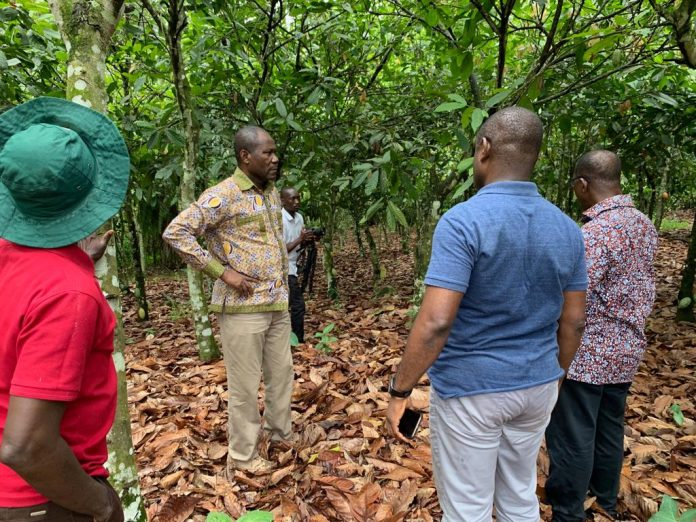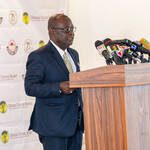Ghana Cocoa Board (COCOBOD) will soon begin the process of handing over the management of diseased and overage cocoa farms which have been successfully rehabilitated to farm owners.
National Cocoa Rehabilitation Programme
This comes after a successful two-year-long rehabilitation of hundreds of acres of cocoa swollen shoot viral disease (CSSVD) infected farms, under the COCOBOD and government-funded National Cocoa Rehabilitation Programme.
51,537.85 hectares ready for hand over
So far, 51,537.85 hectares of diseased and overage cocoa farms have been successfully rehabilitated.
$600m AfDB loan being used to revamp the cocoa sub-sector
Rehabilitation of diseased and overage cocoa farms constitute a major reason Ghana in 2019 secured a receivables-backed $600 million loan from the African Development Bank (AfDB) to revamp the cocoa sub-sector.
$230m dedicated to rehabilitation of diseased and overage farms
Out of this amount, about $230 million is being used to rehabilitate some 156,400 hectares of diseased and overage cocoa farms across the country.
1.45m out of 2.5m hectares of cocoa farms considered to be productive
Prior to the commencement of this rehabilitation, it was estimated that Ghana had more than 2.5 million hectares of cocoa areas, of which about 1.45 million hectares are considered to be productive.
2-day tour of cocoa farms in Western Region
The Chief Executive of COCOBOD, Joseph Boahen Aidoo, made the announcement during a two-day tour of cocoa farms in the Western Region.
He inspected a 145.8-hectare rehabilitated cocoa farm at Kumikrom in the Bekwai District of the Western North Region.
Regular field and farmer-engagement tour
The inspection is part of regular field and farmer-engagement tour of some cocoa communities instituted by the COCOBOD Chief Executive.
Checking the progress of some cocoa road projects
The regular field and farmer-engagement is also an opportunity for the COCOBOD Chief Executive to check the progress of some cocoa road projects in the region.
Owners to receive take-over farms
Interacting with cocoa farmers at Kumikrom, Mr Boahen Aidoo disclosed that it was time for early beneficiaries of the rehabilitation programme to take over the care of their farms.
Strict adherence to good agronomic and agroforestry practices
He asked the farmers to adhere strictly to good agronomic and agroforestry practices to ensure that the farms can produce at their optimum capacity without adverse impacts on the environment.
Curtailing rapid spread of CSSVD on cocoa farms
The National Cocoa Rehabilitation Programme, which was officially launched by President Nana Addo Dankwa Akufo-Addo in 2020, was devised by COCOBOD to curtail the rapid spread of CSSVD on cocoa farms.
Cutting and chemical treatment of cocoa trees on diseased farms
The process begins with the cutting and chemical treatment of cocoa trees on diseased farms.
Disease-tolerant, early bearing, high-yielding cocoa varieties
The farms are then replanted with disease-tolerant, early bearing, high-yielding cocoa varieties.
COCOBOD bears the cost of all the activities
During the two-year-long rehabilitation process, COCOBOD bears the cost of all the activities on the farm and the cost of labour.
GH₵1,000 per hectare paid to farmers
It also gives an amount of GH₵1,000 per hectare to each farmer who has an infected farm which is being rehabilitated. In the case of tenancy, both affected tenant farmers and their landowners are compensated.
315,886 hectares lost to CSSVD
Nationally, 315,886 hectares of cocoa farm had been lost to CSSVD.
A survey conducted in 2017 found that more than half of the 509,295.53 hectares of cocoa farms in the Western North Region had been infected.
Massive drop in production in Western Region
Consequently, cocoa production in the Western North Region had dropped from over 330,000mt in 2010/2011 to 154,000mt.
Safeguards the livelihoods of cocoa farmers
Besides the primary goal of stopping the further spread of the disease and restoring the productivity of CSSVD devastated farms, the programme also safeguards the livelihoods of cocoa farmers, helps to ensure better food security through the planting of plantains, tubers and grains during the first two years as the cocoa trees grow.
Hundreds of thousands of jobs have also been created for the youth in cocoa communities, who provide labour and technical support to rehabilitate the cocoa farms.
COCOBOD set to boost cocoa production with irrigation
Mr Boahen Aidoo also told the farmers that COCOBOD is set to roll out an irrigation programme for farmers in cocoa-growing areas to ensure an all-year round water supply for their farmlands to increase yield.
This is an alternative to counter drought in those areas, resulting in the withering of most of the cocoa trees, stunted growth, and low yield.
According to him, a well rehabilitated farm with irrigation has the potential to fetch 1,809 pods on one tree, which would yield 40 bags of cocoa pods per acre to improve their living conditions.
He hinted of possible fertiliser shortage in the wake of the Russia-Ukraine war, so COCOBOD has decided to engage farmers to adopt best practices to increase productivity.
In addition to the introduction of the irrigation system, he urged farmers to apply the droppings of fowls around their crops to serve as organic fertiliser.
Mr Aidoo commended the farmers for the massive pruning of the trees and advised them to minimise the planting of cassava to intersperse their farms.
He cautioned against the use of unfriendly farming practices such as the application of unapproved chemicals on the cocoa trees.
The Sefwi Bekwai District Officer of COCOBOD, Frank Amamoo Antwi, said farmers had treated a sizeable number of hectares through pruning, weeding and pollination with the help of the 1,030 rehabilitated farmhands in the district.
He added that the cooperative farmers association, made up of 91 workers, each cultivated four acres of land.
“The COCOBOD has also distributed 162,800 plantain suckers and cocoa seedlings to farmers recently,” he stated and commended COCOBOD for the intervention to boost cocoa production in the area.
Traditional authorities told to help halt galamsey
He led officials of COCOBOD to visit the KUMAD Global Impact Limited and Afarinick Company Limited’s planting seedling nursery site for the COCOBOD Rehabilitation Project at Suaman-Dadieso.
Addressing a durbar of the chiefs and people, he appealed to traditional rulers to stamp their authority to uproot the galamsey menace, especially in cocoa-growing areas of the country.
According to him, galamsey activities continue to wreak havoc on cocoa farms, which is taking a toll on the cocoa industry.
He said as custodians of the land, traditional authorities wield more power and owed it a sacred duty to conserve, preserve and protect the land from all forms of degradation.
Mr Aidoo bemoaned the situation where many of the cocoa farmlands had been depleted with the indiscriminate cutting of cocoa trees for galamsey activities.
He explained that plans to introduce irrigation system of farming risks being hindered by the negative impact of galamsey, because farmers cannot rely on polluted streams with all the toxin to irrigate their farmlands.
He was worried about the considerable decline of cocoa production in the Western-North Region, which used to produce a chunk of cocoa in Ghana, saying COCOBOD is moving heaven and earth with major innovative interventions to reverse the trend.
The Chief of Suaman-Dadieso, Nana Kofi Armah, lauded the efforts of COCOBOD to streamline issues in the cocoa industry to boost production.
He admitted that the galamsey menace had become a source of worry to farmers in the Western-North Region.
Nana Kofi Armah commended Mr Boahen Aidoo for holding the key to the future of the cocoa industry in Ghana and appealed to COCOBOD to release money given to cocoa farmers on time and emphasised the need for an irrigation system to irrigate cocoa farmlands all-year round.
He acknowledged that the plantain seedlings nursery, which would feed cocoa farms, has provided employment to a sizeable number of youth in the area.
At Tawiah-Krom, Mr Boahen Aidoo assured the cocoa farmers that COCOBOD would continue to design human-centred policies as part of the Cocoa Enhancement Programme to boost cocoa production and create more employment to better living conditions of people in cocoa-growing areas.
Western-North Region cocoa roads see facelift
Cocoa-growing roads in the Western-North Region have seen a major boost under the ‘Year of the Roads’ project touted by President Akufo-Addo.
As a result, cocoa farmers can cart their farm produce to the Produce Buying Company (PBC) on time.
Mr Aidoo said this when he inspected works on the 38km Benchema-Adjoafua road, explaining that the stretch of road is the heart of the cocoa industry and would be completed in no time.
He said the $43 project is funded by COCOBOD and the Government of Ghana and commended the Amandi Construction Works for the quality of work and the solid layer used to asphalt the road.
He indicated that reports from drivers of long trucks loaded with cocoa found it difficult to climb the hills on the serpentine portion of the road in the past.
The CEO said the construction of a steel bridge at Bia, which used to be narrow, is underway and would be completed in the coming months.
Mr Boahen Aidoo said the government had done well in terms of roads and rejuvenated cocoa farms and assured cocoa-growing areas of witnessing unprecedented construction works on their roads in the coming months
- Tight Race For Next GIS Boss - 10 March 2025
- Church of Jesus Christ, Ga Mantse Foundation renovate Adabraka School - 27 June 2024
- Manufacturers, Trade Minister tussle over proposed cement price regulation - 26 June 2024

